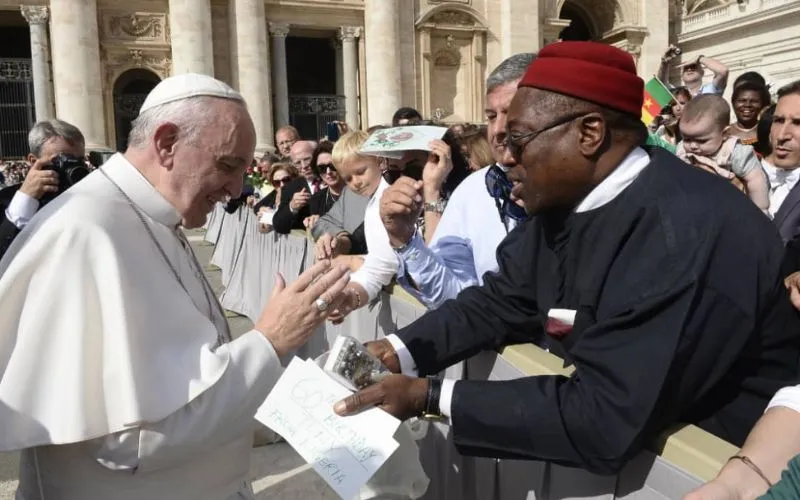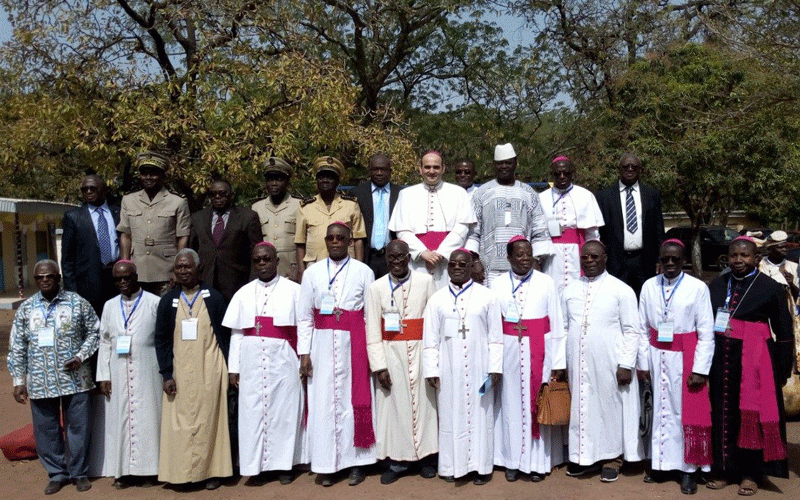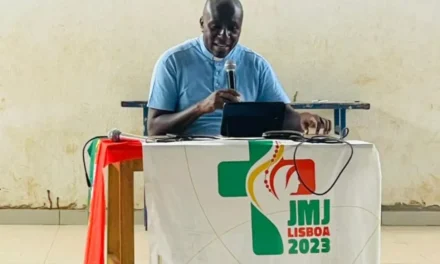The Fathers’ Day 2024n celebration all over Africa and beyond has been extolled by the leaders of the Church. The Correspondent of RECOWACERAO NEWS AGENCY, RECONA based in Accra, the capital of Ghana gathered from a sister journal that the Catholic Fathers examined Fatherhood, Family Values and Threats to African Family.
Details of the information has it that on the occasion of Fathers’ Day 2024, the celebration of fatherhood, paternal bonds and the role of male parents in strengthening family bonds were X-rayed. ACI Africa which is a sister online journal to RECONA featured Catholic men from different African countries who believe they have made a positive impact in the lives of their children.
The Catholic fathers, who hail from Cameroon, Kenya, and Nigeria, Ghana, Sierra Leone, Liberia etc. talked about being a father, protecting the families amid threats to the African family, and being a model of family values for their children who, they believe, someday, will become fathers as well.
One of the men is a married father of four, all grown, goes to the Catholic Church of the Assumption Parish of Nigeria’s in the Archdiocese of Lagos. Simply addressed as Tony. He has been in the parish for 40 years and it is here he was wedded 38 years ago. He is a strong member of the Grand Knight of Saint Mulumba (KSM) and he comes from the Catholic Archdiocese of Onitsha in the Eastern part of Nigeria. Tony has this to say;
I got married to my friend after we dated for four years. I was looking forward to fatherhood and I was mentally prepared for it. Here are the five lessons I have learnt along my fatherhood journey.
Being a father means you watch your children grow and become independent. You watch them get to a point in their lives where they can engage in a debate with you, and even disagree with you.
Fatherhood is a long process. You would be fortunate to go through the entire process and maybe see your children’s children. I have seen mine achieve excellence in school, and even leave home and go across the world as they sought to become independent.
Wherever your children go, what is important for them is what they take away from home; what they take from mommy and daddy. I have always told mine to “remember the child of who you are”. This means that they are not allowed to break the Christian values in our family.
I taught them to always stand for the truth and never to flow with the tide. We have encouraged them to always say what they mean. These days, they have jokingly turned around the statement and they tell me, “Remember the dad of whom you are” and we laugh about it.
You can’t always be there to take the bullet for them, but you can support them through prayers. Our family relies a lot on the intercession of the Saints. We call ourselves a family of Jesuits because the school my children went to is under the patronage of St. Ignatius of Loyola.
My own patron saint is St. Anthony of Padua and my wife’s is St. Rita of Cascia. All the years, these Saints have kept us well protected.
Fatherhood is a full-time engagement. It is not like you can be a father in the morning and take a break in the evening. You worry about your children even when they are grown and have left your home. They preoccupy you everywhere. You wonder whether they are warm and if they have had their meal. But all this brings a father immense joy.
Young fathers in Africa are overburdened by poverty. Because of poverty they don’t have a way to help their families. Others are scared to enter the marriage institution. Poverty has made young men weak and helpless. Some are leaving their young families and going to faraway places outside the continent to make a living.
Poverty is eroding family values because some fathers do what they do, including stealing, for their children to survive. In doing so, they are setting a bad example for their children.
Africa has become a trash bin for all pervasiveness. Our leaders have let us down big time. Because of these leaders, we have not grown up enough to say, ‘keep away your money, we can survive on our own’.
Our jobless young men are so desperate they cannot turn down these offers of aid to perpetrate this perversion. It is important for our leaders to confront this situation. They must accept that they have let us down.
Mr. Njogu is the moderator of the Catholic Men Association (CMA) at St. Austin’s Msongari Parish of Kenya’s Catholic Archdiocese of Nairobi (ADN). His children are all grown. He offers the following insights on being a present father.
Fathers need to be present in the lives of their children. For a long time, it was assumed that it was the mother’s responsibility to take care of the young children. Fathers kept off. But being absent in the lives of your children hurts your relationship with them. They end up growing up without you having any impact on their lives.
Unfortunately, some fathers assume that fatherhood ends at providing material things for the children. They don’t pay attention to their children’s growth milestones. And when they eventually try to establish a connection, they find that the children are already all grown without knowing anything about their fathers.
Simple things like dropping your children off at school help you connect with them. While stuck in traffic on the way to school, you can talk about things that will help you understand your child, and for him to know you.
Always try as much as possible to have dinner with your children and help them with schoolwork. And always try to make up for the time you don’t spend with them.
Edward runs a medical college in Doula, Cameroon. He is a father of two children; 20 years and 16 years old. He tells ACI Africa that he is “a father of many” as he takes care of several orphans and other vulnerable children. Here are his insights into nurturing a Christ-like family.
It is the joy of every responsible young man to be called ‘daddy’ or ‘papa’. Having a Christ-like family is the greatest gift for a father; a family like that of Joseph, Mary and Jesus.
My appeal for Catholic fathers is to hold their families firmly, to provide for them and to protect them from all dangers in the contemporary society where values are being eroded.
I don’t believe that being a father is a challenging task. God already gave us the innate potential to be fathers. I believe that God can’t give you a role that you can’t perform.
It is unfortunate that many young men are choosing to be absentee fathers. From what I have seen, many children raised by a single parent end up adopting wayward behaviours.
Magero belongs to the CMA group of St. Joseph the Worker Kangemi Catholic Parish of ADN. The father of three has been married for 29 years. He shares his experience and that of other Catholic dads raising their children in a low-income settlement.
I am raising my children to become God-fearing adults. This is not an easy task in the community in which we live, where there is a lot of poverty, drunkenness and other characteristics typical of a low-income settlement.
Many fathers rarely interact with their children since their main focus is to provide for their families. They leave for work before their children wake up and come back at night when the children have already gone to bed.
The young men and boys we are raising are experiencing a different environment from ours when we were growing up. With the whole world brought to them on the palm of their hand by a simple tap on the phone, this generation is dangerously exposed. They need us, their fathers, to constantly give them direction. They need us to be their role models.
They need us to constantly remind them that they are in Africa, and that they should not adopt alien cultures, especially those bound to destroy the family – cultures such as same-sex marriages.
As fathers, we must remind our young ones to uphold African values that kept the family unit, and the society glued together. Africans knew the importance of loving and caring for each other. Unfortunately, this value is being eroded, and in its place, now we have individualism. Older men in families would educate young men to be responsible adults. Unfortunately, we no longer have this brand of education.
- SYNODALITY FOR THE AFRICAN IS A REJECTION OF INDIVIDUALISM. - October 23, 2024
- THE ENCYCLICAL, TITLED DILEXIT NOS TO APPEAR SOON - October 22, 2024
- MESSAGE OF HIS HOLINESS POPE FRANCIS FOR WORLD MISSION DAY 2024 20 OCTOBER, 2024. - October 21, 2024






